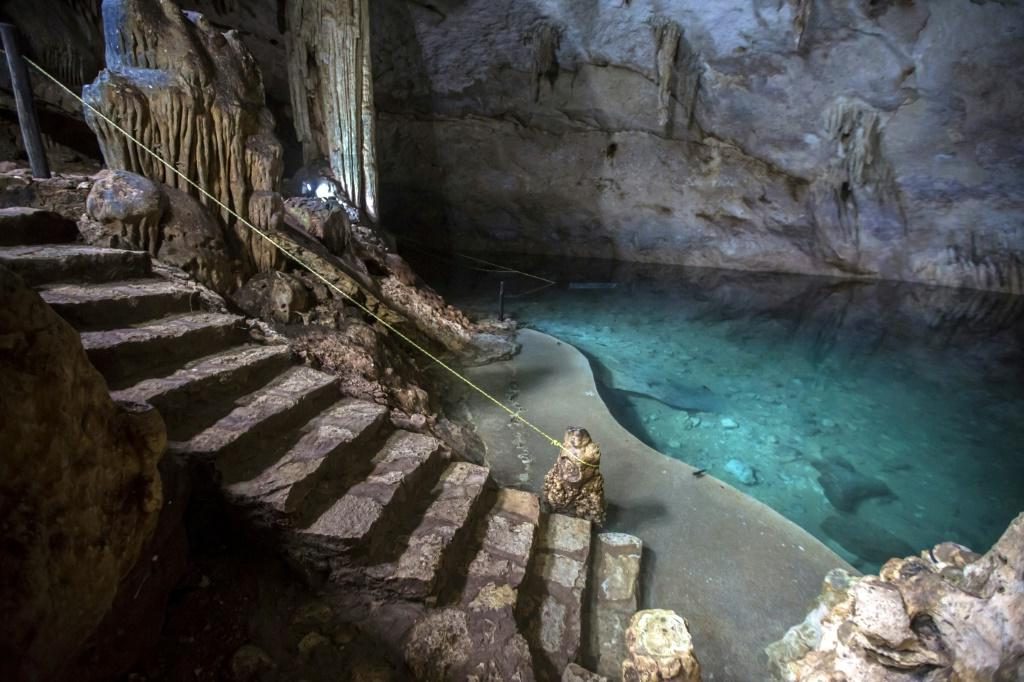RIO DE JANEIRO, BRAZIL – They will “destroy them,” warns Doroteo Hau, an indigenous man fighting the proliferation of pig farms accused of contaminating the “cenotes”, the dazzling springs vital to the Mayan communities of Mexico’s Yucatan peninsula.
Their battle ranges from lawsuits to a recent consultation. The villagers overwhelmingly rejected the pig farms, whose waste, they claim, ended up in the cenotes, one of the main attractions of the famous Riviera Maya in southeastern Mexico.
Read also: Check out our coverage on Mexico
Formed in subway caverns, these aquamarine-colored wells number in the thousands in the lush Mayan jungle and are connected to the Yucatan aquifer, which in some cases supplies its inhabitants through cisterns.

A few steps away from the wooden staircase that descends to the silent pond in the municipality of Homún, Doroteo shows his sadness and anger at the damage to this “sacred” place to satisfy – according to him – the demand for meat from China.
The “area where we have our gift from God is like a sieve, all the surrounding water goes down into the cenotes (…) They are going to destroy what we are taking care of as it should be!” says Hau about the porosity of the soil.
“Ma, ka’anano’ on!” sums up the community’s sentiment in Mayan: “No, we are tired!”.
SUPREME COURT DECISION
This 62-year-old tour guide formed together with neighbors the organization Kanan ts’ono’ot (Guardians of the Cenotes).
Last May, they succeeded in getting the Supreme Court to ratify the suspension of a farm of more than 45,000 pigs in Homún, population 7,500, but the case is on appeal.
“Tourists will stop coming if the bad smells reach here,” fears Jesús Dzul, a cab driver who transports visitors who come to swim in the crystalline waters.
Because of its cenotes, paradisiacal beaches, and archaeological routes, the Yucatan Peninsula is one of Mexico’s main attractions, where tourism contributes 8.7% of its GDP.
There are 257 pig farms in the region, but only 22 submitted environmental impact studies, according to a 2020 report by the Greenpeace organization.
The Ministry of the Environment did not respond to a request for information from AFP.
Inhabitants of Homún, Sitilpech, Kinchil, and Chapab denounce that farms in difficult access dump waste into the jungle without treatment, which the producers deny.
If the Homún farm reopens, Doroteo affirms that he is even willing to “take machetes”. “We have to defend [the natural resources]!” he justifies before the consultation, which had no legal character.
Sitilpech is home to another farm, whose closure was also requested by the locals to the courts. “The stench is too much (…), you can’t breathe,” Teodorita Rejón, 71, commented with a gesture of disgust before a march against the pig farmers. “Farms out!” shouted a protester as she dragged a plastic pig through the dirt streets.
TOURISM VS AGRICULTURE
According to industry data, pig production in Mexico rose 3.1% between 2019 and 2020 to 1.64 million tons. Meanwhile, exports grew 29.7%, totaling US$916 million, according to the U.S. Department of Agriculture. Sales to China soared from 2017, rising from US$2 million that year to US$264.3 million in 2020.
Between 2018 and 2019, African swine fever decimated the herd in the Asian country, the largest consumer of these meats, which raised foreign demand and prices. China is Mexico’s second-largest customer after Japan.
The stakes are so high that, according to Yolanda Chi, the conflict has escalated. “We are threatened by those who work on the farms, they give them money to do it, but we are going to vote,” Chi pointed out in San Fernando, where a group of men insulted voters.
The “no” to the farms won in two of the three towns where there was consultation.
The businessmen assure that they comply with quality standards. “We don’t contaminate anything,” Alberto Alfonso, production director of Grupo Porcícola Mexicano Kekén, the largest in Yucatán, told AFP during a tour of a farm in Chapab. To prove it, he shows a biodigester and oxidation and ozonation lagoons used in wastewater treatment.
But Viridiana Lázaro, author of the Greenpeace study, maintains that samples taken from the cenotes and wells near the farms show “contaminants”.
Experts from the United Nations Development Program also found them. “A part is attributable to the farms because [the samples] have fecal coliforms, traces of antibiotics that do not come from agriculture or urban waste,” said Xavier Moya, the organization’s representative in Yucatan.
(afp)

